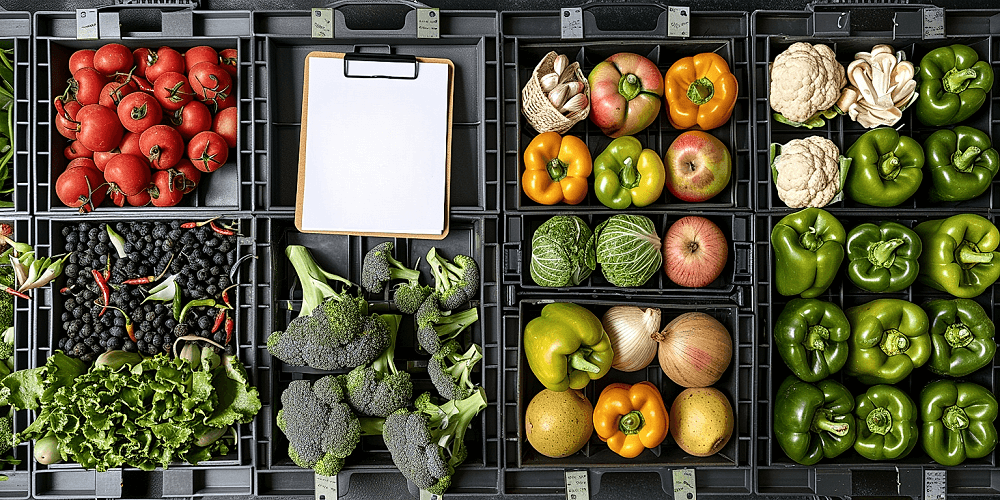The distribution industry, specifically within the realm of produce, is complex and subject to uncompromising state, federal, and international regulations.
These regulations, while designed to ensure food safety and fair trade practices, can pose significant operational challenges for teams in this sector.
The efficiency with which teams understand and adhere to these ever-evolving rules often determines the level of success a produce distributor can achieve.
Effective compliance training then, is a top priority.
In navigating this complex environment, equipping the team with the right knowledge and skills is key.
Here are some practical ways to strengthen the compliance training within your produce distribution team.
Contents [hide]
- Compliance Training Tips For Produce Distribution Teams
- 1. Regularly update knowledge on food safety regulations
- 2. Ensure accurate documentations and records of produce.
- 3. Understand and follow proper sanitization practices.
- 4. Conduct Regular In-House Compliance Training
- 5. Stay updated on import/export compliance rules.
- 6. Proper handling and storage of perishable goods
- 7. Implement measures for waste management and reduction
- The Bottom Line
Compliance Training Tips For Produce Distribution Teams
1. Regularly update knowledge on food safety regulations
As part of a produce distribution team, it is essential to regularly update your knowledge on food safety regulations.
Distribution teams deal with perishable goods that have direct impacts on consumer health. Therefore, staying informed about food safety regulations ensures that your practices are legal, ethical, and safe for consumers.
Food safety regulations are subject to change due to advancements in science, technology, and changes in public health concerns.
Staying updated on such changes can help prevent outbreaks of foodborne illnesses and reduce the risk of legal issues related to non-compliance.
Regulations can include different aspects such as storage temperatures, packaging requirements, or acceptable levels of certain substances.
To stay updated, keeping track of updates from authorities such as the Food and Drug Administration (FDA) or the European Food Safety Authority (EFSA) can be beneficial in a significant way.
Regularly updating knowledge on food safety regulations is not just a matter of compliance; it is crucial for ensuring public health and maintaining consumer trust.
Understanding and implementing these regulations can differentiate a company in a competitive market by demonstrating commitment to quality and safety.
Moreover, this knowledge can be used in compliance training to improve the overall performance of the distribution team.
There exist many resources to help stay updated such as webinars, online courses, and seminars by health authorities or industry professionals.
These resources often include the latest trends, best practices, news, and regulations, all of which can positively impact the company’s safety practices and compliance rate.
Additionally, it helps the distribution team to understand the rationale behind these regulations, promoting an intrinsic motivation to comply with these rules.
*Continual education and training in food safety not only enhance the understanding of safety practices but also help in implementing them effectively within the team.
New or modified regulations often bring about changes in the handling, storage and transport processes of the goods.
By being knowledgeable about these changes, teams can proactively adjust their practices, avoiding last-minute chaos and ensuring seamless transitions.
Having an expert in food safety regulations within the distribution team can be a valuable asset as their insight and advice would ensure a high standard of safety practices.
Conclusively, the periodic update of knowledge on food safety regulations is a crucial aspect of compliance training for produce distribution teams.
2. Ensure accurate documentations and records of produce.
One of the most critical processes in the successful operation of any produce distribution enterprise is ensuring the accuracy of documentation and maintaining up-to-date records of all produce
The process of recording details is more than just jotting down quantities. It involves charting the details of each type of produce, the condition of their arrival, their source and their destination. These records ensure a systemic approach to management.
Accurate records are not just for the benefit of your organization alone; they are necessary for regulatory compliance, traceability and ensuring general food safety.
All the necessary details must be included and updated regularly. Even seemingly trivial information such as the time of day when the produce was received or exact temperatures the produce have been stored at can be critical information.
Missing or inaccurate documentation can cause problems ranging from minor inconveniences to major breach of trust with partners, customers, or regulatory bodies. This can lead to costly lawsuits or actions against your business by government agencies.
Therefore, digitized systems should be used to avoid error-prone manual record-keeping.
Electronic documentation systems offer more security, accuracy, and rapid access to information when necessary.
Staff members need to be thoroughly trained on using these digital systems and must understand the importance of keeping accurate records. Continuous retraining in this aspect is vital because the standards and regulations often change.
Another essential aspect of ensuring accurate documentation and records is regular auditing. Audits are checkpoints to make sure that all data and the process of documenting is in line with company policy and industry standards.
Audits don’t have to be exhausting or complex. Organizations can use simple, everyday inputs to drive continuous improvement. For example, understanding why a non-compliant product was shipped and taking necessary actions to prevent it from happening in the future.
Apart from company-internal audits, external or third-party audits are also essential for providing a fresh perspective, verifying compliance, and giving the necessary certification required by the industry.
It is vital that all staff members understand the need to maintain these records accurately. Compliance training is crucial, and ongoing training in the specific procedural and system changes should be a part of your company’s operations.
Companies must develop a jaw-drop attitude towards documentation accuracy. Only then, the organization can rise above possible scandals, breaches, infringements, litigation, and bad press.
It is not enough just to train the staff once but to promote a culture of continuous learning and improvement.
A company should use every mistake as a learning opportunity, and every success as a step towards creating a trust-worthy brand and avoiding costly penalties.
3. Understand and follow proper sanitization practices.
One of the primary responsibilities of produce distribution teams is to understand and follow proper sanitization practices.
This procedure not only ensures the safety and cleanliness of the produce being distributed but also maintains the integrity and reputation of the distribution companies themselves.
Each distribution team member should be well-versed in the various steps and methods involved in proper sanitization.
Completing a comprehensive compliance training program or course can go a long way in grooming these individuals to carry out sanitization practices with utmost precision and care.
Right from cleaning the work surfaces with appropriate cleaning agents to using the right protective gear, every little sanitization practice counts.
Remember, an improperly sanitized surface or equipment can lead to the rapid multiplication of harmful pathogens, which could contaminate the produce and potentially make consumers sick.
Mandatory sanitization checks at regular intervals are essential to ensure that the sanitization practices being followed are up to the mark and in line with the set standards and guidelines.
When these checks reveal areas for improvement, corrective measures should be taken promptly to avoid any lapse in these critically important tasks.
In addition to this, all team members should be trained to adequately manage any kind of sanitization-related emergency to prevent any significant detriment to the produce.
Produce distribution teams should also be encouraged to stay updated on the latest sanitization practices and guidelines to ensure optimum safety and quality of the produce.
Moreover, they should be made aware of the potential legal liabilities associated with the failure to adhere to proper sanitizing practices.
Periodic competitions or rewards can be introduced to motivate the team members to adhere stringently to the sanitization compliance measures.
Extensive training on the potential health hazards associated with improper sanitization can further enforce the importance of these practices and ensure high levels of compliance.
Such an approach will ultimately impact the overall quality and safety of the produce and elevate the reputation and customer confidence in the distribution company.
Therefore, ensuring understanding and adherence to proper sanitization practices is pivotal for the success and longevity of produce distribution teams.
4. Conduct Regular In-House Compliance Training
The world of produce distribution is a complex one, filled with set regulations and guidelines that need to be adhered to.
Keeping a team up-to-date is a vital component in maintaining a successful operation, and that’s where in-house compliance training comes into play.
Regularly conducting such training ensures all team members are well-versed in the latest laws, regulations, and distributor best practices.
This precarious matter is not about simple rule adherence, but about securing a sustainable and profitable operation.
One way to conduct effective compliance training is to employ a mixture of teaching methods, such as presentations, workshops, and hands-on learning.
This promotes engagement with the material and helps to accommodate a variety of learning styles.
Furthermore, compliance training should be considered a continuous process, not a one-time event.
As regulations and industry best practices constantly shift and change, it’s crucial to keep your team aware of the latest developments.
This will not only keep your operation in good legal standing but also position your business as a leader in the field.
Another important aspect of effective compliance training is to make it as practical as possible.
Use real-world examples and case studies to demonstrate the application of regulations in everyday scenarios within your business.
This approach can help demystify regulatory complexities and make it easier for staff to understand and implement rules.
Remember, the goal of compliance training is not to flood your team with a vast amount of information all at once, but to build cumulative knowledge over time.
Make sure to set aside regular time for training and revisit key topics periodically to ensure the information is retained and applied.
Lastly, do not limit compliance training to your operational teams only.
Include your management and leadership teams in the process as well.
This will ensure consistency in practices across different levels of the organization and underline the importance of compliance training at all tiers.
5. Stay updated on import/export compliance rules.
The complex and rapidly evolving world of import/export regulations necessitate that produce distribution teams maintain a constant vigilance and stay updated.
Each country has its unique standards, procedures, and restrictions concerning food produce import or export, there can be potential pitfalls if a business does not stay current with these laws.
For example, a country’s regulations could change due to political, social, or environmental events, affecting produce distribution.
Therefore, it’s essential for a team to know and understand these changing regulations to ensure they adhere to them and stay in compliance.
To effectively stay updated with these regulations, it is advisable to leverage sources of information that specialize in international trade law.
Resources such as government websites, trade associations, and compliance consultants can provide valuable insights into the import/export market.
Additionally, attending industry seminars and workshops is another great way to keep up to date with compliance rules and gather insights on trends in the industry.
Another vital aspect to bear in mind is the documentation required for produce import and export.
Such paperwork often needs to be accurately completed to satisfy import/export regulation and can significantly differ depending on the destination or origin of the produce.
Failure to meet the adequate documentation guidelines can lead to costly delays or fines.
Furthermore, it’s not only import/export laws that producers need to be aware of but also any transportation regulations required for moving produce across international borders.
These regulations can impact how goods are packed, labeled, and transported, which in turn, could affect the overall distribution plan.
It is important for compliance training to provide updates on these practices so that everyone involved, from logistics to sales, stays knowledgeable and aware of the best operational practices.
In short, staying updated on import/export compliance rules helps to mitigate risks and prevent potential operational hiccups. It enables the producers to run their operations smoothly.
To ensure that all team members are updated, it is helpful to have a dedicated compliance department or manager responsible for disseminating updates and changes in the regulatory landscape on a timely basis.
This concentrated effort not only allows the organization to adapt to regulatory changes quickly but also ensures that the knowledge is effectively communicated and understood by all team members.
6. Proper handling and storage of perishable goods
When discussing proper handling and storage of perishable goods in a produce distribution team, we must start with a thorough understanding of the perishable goods in question.
To ensure the utmost in safety and freshness, it becomes an obligation rather than an option to keep goods at optimal temperatures and humidity levels.
Working on this principle, different perishable goods require different levels of temperature and humidity for storage.
Detailed knowledge of specific storage requirements is a must for every worker in the distribution team.
It’s not enough to ensure that temperatures are appropriate, regular maintenance, cleaning, and quality control of the storage equipment are also necessary.
Every produce distribution team member should be trained to check for signs of spoilage or damage, and accurately record any issues.Given these realities, a critical part of compliance training for produce distribution teams should be a focus on detailed product inspection during storage, handling, and transport processes.
Stringent hygiene measures should be adhered to during all stages of handling, from the fields to the stores.
Quality control, pest control, and cleaning practices should be ingrained into every aspect of the operation as part of the team’s hygiene standards.
Produce should be stored according to proper stacking rules to avoid damage and to promote easier access for inspections.
Another key aspect to consider, in line with proper handling and storage of perishable goods, is to ensure the quick and efficient dispatch of produce to designated locations.
Ready-to-eat produce or those with short shelf life should be units of utmost priority for the team.
The use and maintenance of appropriate transportation vehicles is also a significant part of the handling and storage process.
Such vehicles should be regularly serviced and inspected to minimize the risk of breakdown and consequent perishable goods damage or loss.
Lastly, a crucial aspect of proper handling and storage is to ensure constant communication within the team and with external stakeholders to conduct timely checks, report faults and manage risks in real-time.
This means every team member needs to be equipped with effective communication skills and emergency handling techniques to guarantee the well-being of the perishable produce and overall food safety compliance.
7. Implement measures for waste management and reduction
Understanding the importance of waste management and reduction is crucial for any produce distribution team.
Implementing these measures, not only helps comply with local and international regulatory requirements, but also promotes sustainable business practices.
Formulating a comprehensive waste management strategy with clear goals and objectives is the first step towards this journey.
In this strategy, teams ought to identify the types of waste they generate, quantify them, and then determine the best methods of disposal.
This thorough understanding of waste profile can immensely help to develop plans to reduce, recycle, or reuse the waste materials.
Carefully conducted audits can help in understanding the quantity and type of waste being produced at different stages of distribution.
Teams can monitor and control waste production by making use of waste tracking systems.
Implementation of such systems can lead to a significant cut-down on unnecessary waste production.
Produce distribution teams also need to invest in regular compliance training on waste management techniques.
Such training sessions should aim to equip team members with thorough knowledge on the types of waste, their amount, disposal methods, and potential ways to minimize them.
Another key role in waste reduction lies in the packaging methods used in the distribution process.
For instance, opting for reusable packages or biodegradable options can significantly decrease the amount of non-biodegradable waste.
Also, maintaining a quality control department ensures that preventive measures are in place to preclude wastage before it occurs.
This proactive approach limits the quantity of waste, helps in the management of garbage, and further promotes the principles of sustainable development.
Furthermore, all the waste management efforts must be well documented and analysed.
Scrutinizing the effectiveness of the implemented measures enables teams to adjust their strategies, leading to continuous improvement in waste management.
Incorporating these practices, products are transported in a controlled environment which not only increases their shelf-life but also reduces the chances of waste creation.
The Bottom Line
Maintaining a high standard in food safety and product handling requires rigorous adherence to regulations, thorough documentation, and continuous learning.
Undertaking regular training can enhance in-house compliance, while staying abreast of changes in import/export laws can ensure seamless operations.
Precise handling and storage of perishable goods can significantly reduce wastages and enhance quality.
Implementing robust waste management measures can further minimize environmental impacts.
Therefore, these strategies can streamline operations, boost customer trust and confidence, and drive businesses’ growth and sustainability in the food industry.




